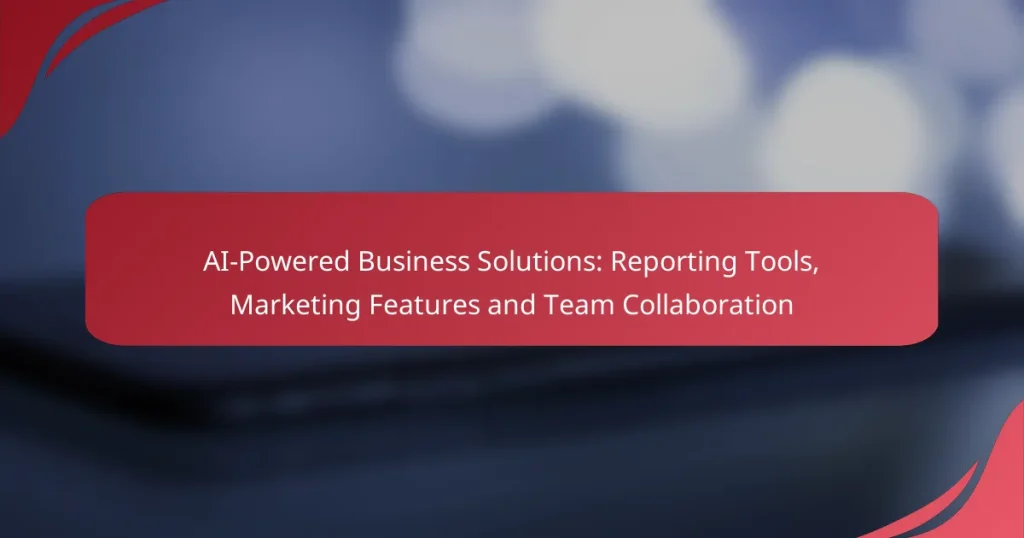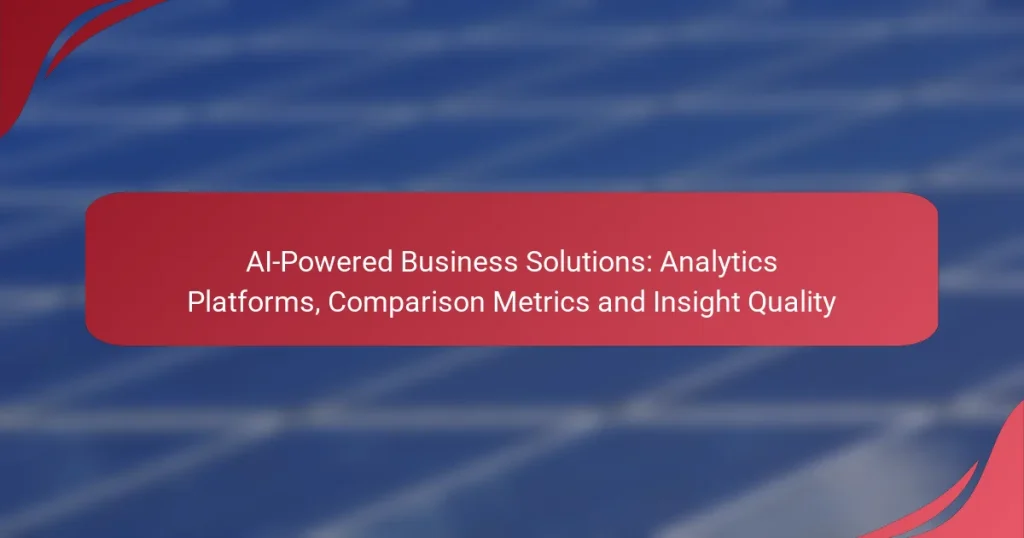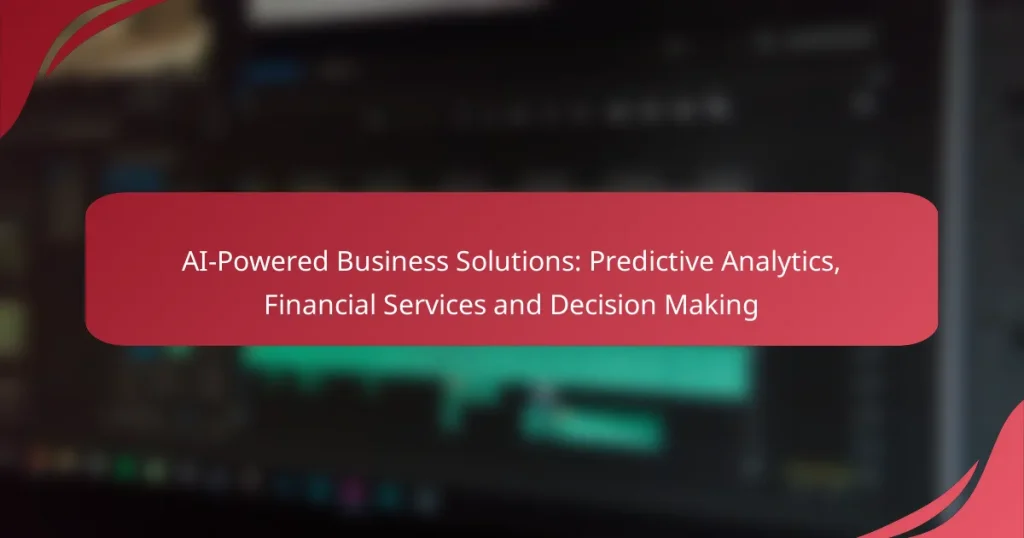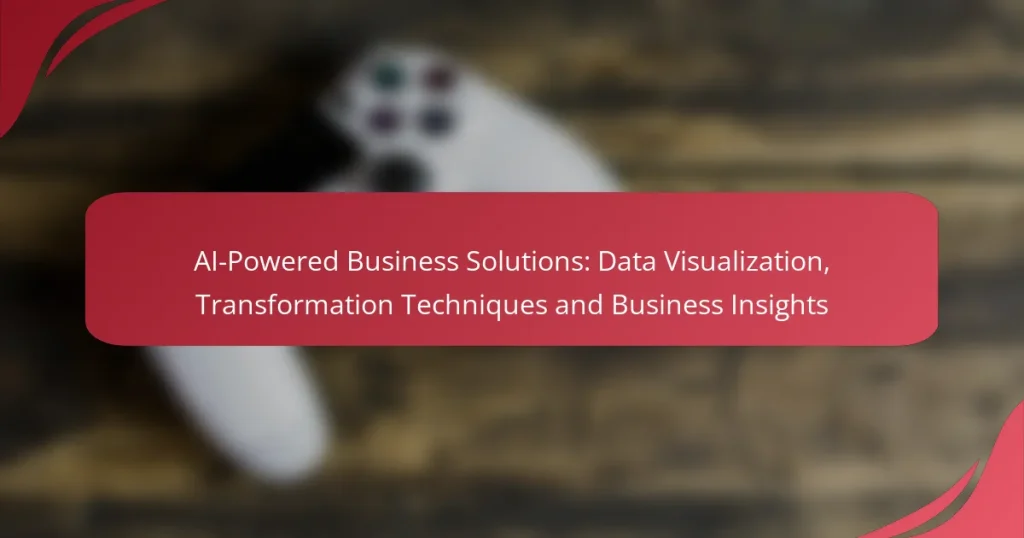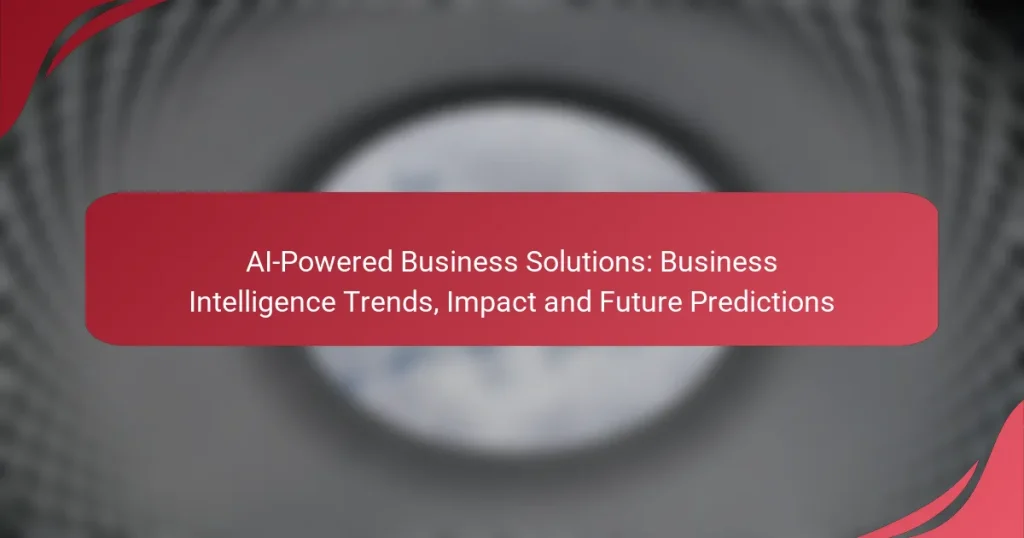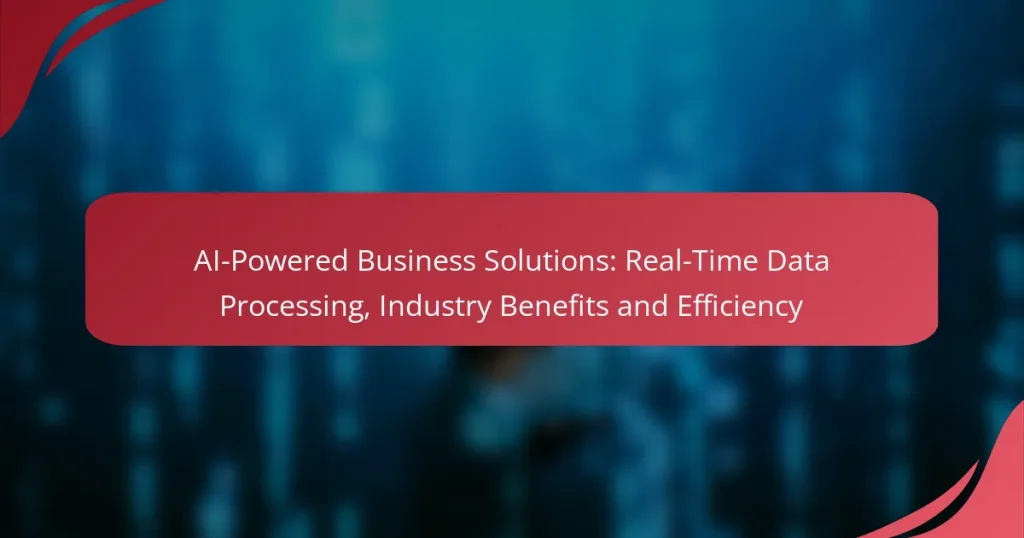AI-powered business solutions are transforming the landscape of decision-making by enabling data-driven insights that enhance accuracy and operational efficiency. By utilizing advanced analytics and machine learning algorithms, these tools empower companies to swiftly analyze vast datasets, uncover trends, and make informed choices that align with market dynamics and consumer behavior.
AI-Powered Business Solutions: Analytics Platforms, Comparison Metrics and Insight Quality
AI-Powered Business Solutions: Market Research Tools, Selection Criteria and Business Impact
AI-Powered Business Solutions: Predictive Analytics, Financial Services and Decision Making
AI-Powered Business Solutions: Data Visualization, Transformation Techniques and Business Insights
AI-Powered Business Solutions: Business Intelligence Trends, Impact and Future Predictions
AI-Powered Business Solutions: Real-Time Data Processing, Industry Benefits and Efficiency
What are the best AI-powered business solutions for data-driven decision making?
The best AI-powered business solutions for data-driven decision making include tools that enhance analytics, automate insights, and improve operational efficiency. These platforms leverage machine learning and artificial intelligence to help businesses make informed choices based on data trends and patterns.
IBM Watson Analytics
IBM Watson Analytics provides a robust platform for data analysis, offering natural language processing and predictive analytics. Users can easily visualize data and uncover insights without needing extensive technical skills. This tool is particularly useful for businesses looking to enhance their decision-making processes through intuitive dashboards and automated reporting.
Consider using IBM Watson Analytics if your organization requires advanced analytics capabilities and integration with other IBM services. It is suitable for various industries, including healthcare and finance, where data-driven insights are crucial.
Microsoft Azure Machine Learning
Microsoft Azure Machine Learning is a comprehensive cloud-based service that enables businesses to build, train, and deploy machine learning models. It supports a wide range of programming languages and frameworks, making it versatile for developers and data scientists. Azure’s integration with other Microsoft products enhances collaboration and data sharing across teams.
This solution is ideal for organizations that want to leverage existing Microsoft infrastructure and tools. It offers scalability and flexibility, allowing businesses to adjust their data processing needs according to growth and demand.
Salesforce Einstein Analytics
Salesforce Einstein Analytics is designed to integrate seamlessly with Salesforce’s CRM platform, providing users with actionable insights directly within their sales and marketing workflows. This tool uses AI to analyze customer data, predict trends, and recommend actions, helping teams optimize their strategies.
For businesses already using Salesforce, Einstein Analytics is a natural choice to enhance data-driven decision making. It allows for real-time analytics and tailored dashboards, ensuring that users can access relevant insights quickly.
Google Cloud AI
Google Cloud AI offers a suite of machine learning tools that help businesses analyze large datasets and derive insights efficiently. It includes services like AutoML, which allows users to create custom models without extensive coding knowledge. Google Cloud’s infrastructure supports high scalability and performance for data-intensive applications.
This solution is particularly beneficial for companies looking to harness the power of AI without significant upfront investment in hardware. Its pay-as-you-go pricing model can be advantageous for startups and small businesses aiming to manage costs effectively.
Tableau with AI capabilities
Tableau, known for its data visualization strengths, has integrated AI capabilities to enhance its analytics offerings. Users can leverage features like Explain Data, which automatically identifies and explains trends in datasets, making insights more accessible. This tool is particularly effective for visual learners who benefit from graphical representations of data.
Consider using Tableau if your organization prioritizes data visualization alongside analytics. It is suitable for teams that need to present data findings clearly to stakeholders, enabling better communication and understanding of complex data sets.
How can AI enhance data analysis for businesses?
AI enhances data analysis for businesses by automating processes, generating insights, and improving accuracy. By leveraging machine learning algorithms, companies can analyze vast amounts of data quickly, leading to more informed decision-making.
Automated insights generation
Automated insights generation involves using AI algorithms to sift through data and identify trends or anomalies without human intervention. This process can significantly reduce the time spent on manual analysis, allowing businesses to focus on strategic initiatives.
For example, a retail company might use AI to analyze customer purchasing patterns, automatically generating insights about which products are trending. This can help inform inventory decisions and marketing strategies.
Predictive analytics for forecasting
Predictive analytics utilizes historical data and AI models to forecast future trends and behaviors. Businesses can anticipate customer needs, market shifts, and operational challenges, enabling proactive strategies.
For instance, a financial institution might employ predictive analytics to assess credit risk, using past customer data to predict future payment behaviors. This can lead to better lending decisions and reduced default rates.
Real-time data processing
Real-time data processing allows businesses to analyze data as it is generated, providing immediate insights and facilitating timely decision-making. This capability is essential in fast-paced environments where conditions can change rapidly.
For example, a logistics company can use real-time data processing to track shipments and optimize routes on the fly, improving efficiency and reducing costs. Implementing such systems often requires robust infrastructure and investment in AI technologies.
What are the key benefits of AI in business decision making?
AI enhances business decision making by providing data-driven insights that improve accuracy, speed, and customer understanding. By leveraging algorithms and machine learning, companies can make informed choices that align with market trends and consumer behavior.
Improved accuracy in predictions
AI systems analyze vast amounts of data to identify patterns and trends, leading to more accurate predictions. Businesses can utilize predictive analytics to forecast sales, customer demand, and market shifts, which helps in resource allocation and strategic planning.
For instance, retailers can use AI to predict inventory needs based on seasonal trends, reducing excess stock and minimizing waste. This accuracy can lead to cost savings and increased profitability.
Faster decision-making processes
AI accelerates decision-making by processing data at speeds unattainable by humans. Automated systems can analyze real-time data and generate insights almost instantaneously, enabling businesses to respond quickly to changing conditions.
For example, financial institutions use AI to assess credit risks in seconds, allowing for faster loan approvals. This rapid response can enhance customer satisfaction and improve competitive positioning.
Enhanced customer insights
AI provides deeper insights into customer behavior by analyzing data from various sources, such as social media, purchase history, and online interactions. This information helps businesses tailor their offerings to meet customer needs more effectively.
Companies can segment their customer base and personalize marketing strategies, leading to higher engagement rates. For instance, an e-commerce platform might use AI to recommend products based on previous purchases, increasing the likelihood of additional sales.
What criteria should businesses consider when choosing AI solutions?
Businesses should consider integration with existing systems, scalability, and cost-effectiveness when selecting AI solutions. These criteria ensure that the chosen technology aligns with current operations, can grow with the business, and remains financially viable.
Integration with existing systems
Choosing an AI solution that integrates seamlessly with current systems is crucial for minimizing disruption. Look for platforms that offer APIs or connectors to existing software, which can facilitate smooth data exchange and workflow continuity.
Evaluate how the AI solution will interact with your existing tools. For example, if your business relies on specific CRM or ERP systems, ensure the AI can pull and push data effectively without requiring extensive manual input.
Scalability of the solution
Scalability refers to the ability of the AI solution to grow alongside your business. A scalable solution can handle increased data volume and user load without compromising performance. This is particularly important for businesses anticipating growth or seasonal fluctuations.
When assessing scalability, consider whether the solution can be expanded with additional features or modules. For instance, a basic AI analytics tool might be sufficient initially, but as your needs evolve, you may require more advanced capabilities.
Cost-effectiveness
Cost-effectiveness involves evaluating both the initial investment and the ongoing operational costs of the AI solution. Businesses should consider not only the purchase price but also maintenance fees, subscription costs, and potential training expenses for staff.
To determine cost-effectiveness, compare different solutions based on their features and the value they provide. A higher upfront cost might be justified if the solution significantly improves efficiency or reduces labor costs in the long run.
What are the challenges of implementing AI in business?
Implementing AI in business presents several challenges that can hinder its effectiveness and integration. Key issues include data privacy concerns, high initial investment costs, and a lack of skilled personnel to manage and operate AI systems.
Data privacy concerns
Data privacy is a significant challenge when adopting AI technologies. Businesses must ensure compliance with regulations such as the GDPR in Europe or CCPA in California, which impose strict guidelines on data handling and user consent.
To mitigate privacy risks, companies should implement robust data governance frameworks and conduct regular audits. Transparency with customers about data usage can also build trust and enhance user engagement.
High initial investment
The initial investment for AI solutions can be substantial, often requiring significant capital for technology acquisition, infrastructure upgrades, and ongoing maintenance. Costs can vary widely, typically ranging from tens of thousands to millions of dollars, depending on the scale and complexity of the implementation.
Businesses should conduct a thorough cost-benefit analysis before proceeding. Exploring cloud-based AI services can reduce upfront costs and provide flexibility in scaling operations as needed.
Lack of skilled personnel
A shortage of skilled personnel is a critical barrier to effective AI implementation. Many organizations struggle to find qualified data scientists, AI specialists, and engineers who can develop and maintain AI systems.
To address this gap, companies can invest in training programs for existing employees or partner with educational institutions to create talent pipelines. Additionally, leveraging user-friendly AI platforms can help non-experts utilize AI tools without extensive technical knowledge.
How does AI impact e-commerce decision making?
AI significantly enhances e-commerce decision making by analyzing vast amounts of data to identify trends and customer preferences. This leads to more informed strategies that can improve sales and customer satisfaction.
Personalized shopping experiences
AI creates personalized shopping experiences by leveraging customer data to tailor product recommendations and marketing messages. By analyzing browsing history, purchase patterns, and demographic information, AI algorithms can suggest items that are more likely to resonate with individual shoppers.
For example, an online retailer might use AI to recommend products based on a customer’s previous purchases, increasing the likelihood of additional sales. This personalization can lead to higher conversion rates, often improving them by 10-30% depending on the implementation.
To effectively implement personalized shopping experiences, businesses should focus on collecting accurate customer data and continuously refining their algorithms. However, they must also be cautious about privacy regulations, such as GDPR in Europe, ensuring they handle customer information responsibly.
